Key takeaways:
- Civic engagement fosters community connections, personal responsibility, and a deeper understanding of social issues like homelessness.
- Homelessness charity not only meets immediate needs but also humanizes the issue and promotes long-term solutions through community advocacy.
- Volunteering enhances personal skills such as leadership, empathy, and effective communication while deepening commitment to social change.
- Personal interactions during volunteering create meaningful connections that inspire advocacy for systemic reforms to address homelessness.
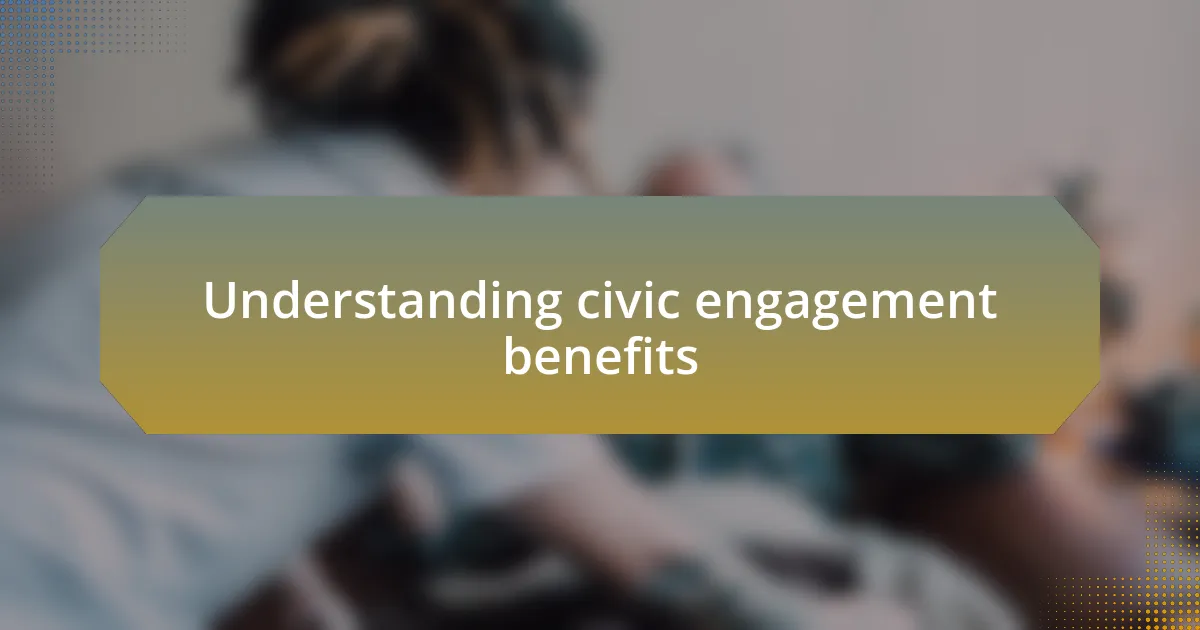
Understanding civic engagement benefits
Civic engagement offers a profound sense of community connection that many might overlook. I remember volunteering at a local shelter, and it was eye-opening to see firsthand how our efforts impacted individuals’ lives. The shared smiles and gratitude from those we helped are priceless reminders of why our engagement matters.
Have you ever found yourself wondering how a small act can ripple through a community? When I organized a fundraising event, I witnessed the power of collective action. One person’s initiative sparked enthusiasm in others, creating a wave of support that not only raised funds but also built lasting relationships among volunteers, fostering a deeper sense of belonging.
Engaging civically also cultivates a sense of responsibility and purpose. After participating in advocacy efforts, I felt a renewed appreciation for the systems and policies that shape our world. It’s one thing to donate; it’s another to understand and address the root causes of homelessness, leading to meaningful change that can uplift entire communities.
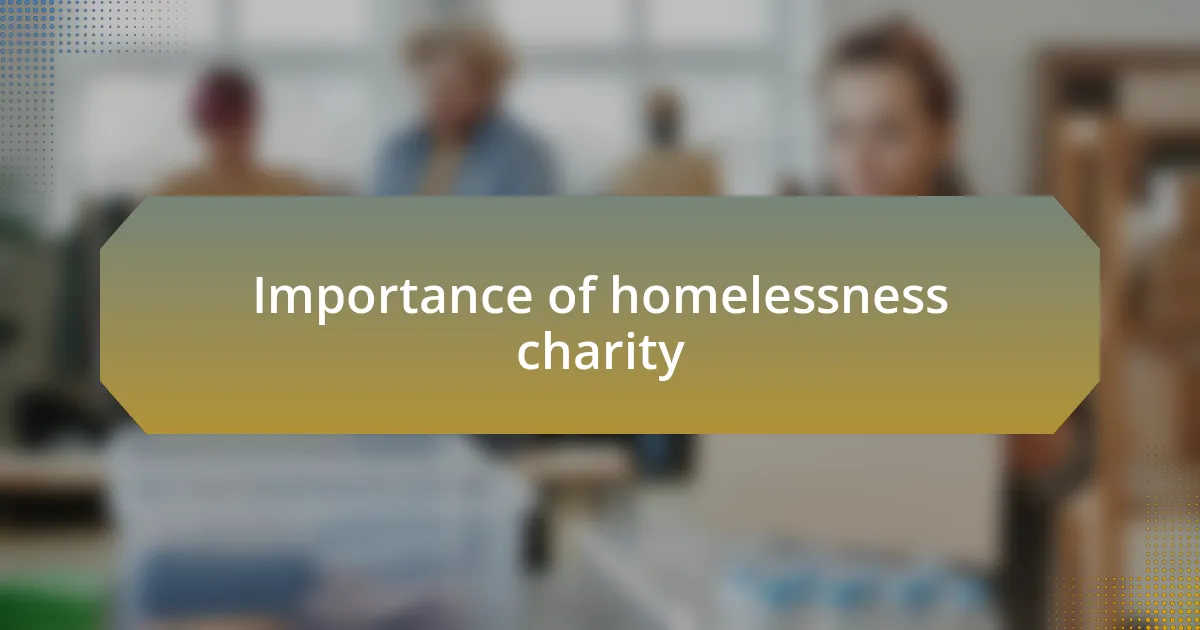
Importance of homelessness charity
Addressing homelessness through charity is essential as it not only meets immediate needs but also fosters long-term solutions. I recall a day when I volunteered at a food pantry; witnessing individuals receiving fresh meals was moving, yet it highlighted the need for sustainable support. Each meal served was a reminder that charity is the first step toward rebuilding self-sufficiency in the lives of those affected.
A powerful aspect of homelessness charity lies in its ability to humanize the issue. Engaging with people experiencing homelessness transformed my perspective. I had a heartfelt conversation with a man who shared his story of job loss and family separation. It made me think—how many others are caught in similar circumstances? This emotional connection is vital; it motivates communities to take action and advocate for policies that create lasting change.
Moreover, homelessness charities serve as critical platforms for raising awareness. When I attended community discussions initiated by a local nonprofit, I realized that educating others about the complexities of homelessness can shift perceptions. Many people are surprised to learn that factors like mental health and affordable housing are intertwined. This understanding can ignite a passion for supporting not just individuals, but broader systemic reforms necessary to tackle homelessness effectively.
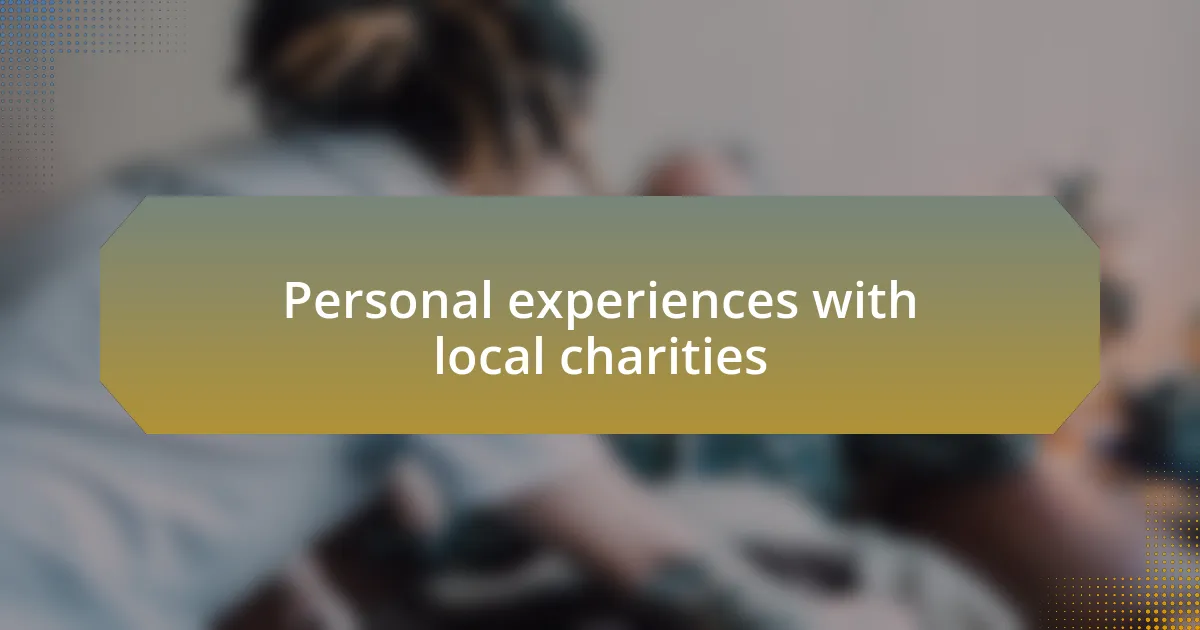
Personal experiences with local charities
Volunteering with a local charity opened my eyes to the incredible stories behind the statistics of homelessness. One evening, while sorting donated clothes, I met a young woman who had just regained her footing after a long struggle. Hearing her narrative made me wonder—how many lives could change with just a little support from our community? It was a stark reminder that every item donated holds the potential to uplift someone’s spirits.
During another experience, I participated in a shelter event where we served dinner. I remember chatting with an older gentleman who had once been a teacher. His passion for education was evident, yet his current situation left him feeling invisible. It struck me deeply; how could someone so knowledgeable and accomplished end up in such a precarious position? Moments like these inspire me to advocate for better resources and opportunities for those in need.
I’ve often volunteered on weekends, and each encounter has left a lasting imprint on my heart. One day, I helped organize a fundraiser. As I listened to the stories shared by those who benefitted from the charity, I couldn’t help but feel a sense of urgency to do more. Isn’t it astonishing how small gestures can create ripples of hope? These personal interactions consistently motivate me to stay engaged and push for change on a larger scale.
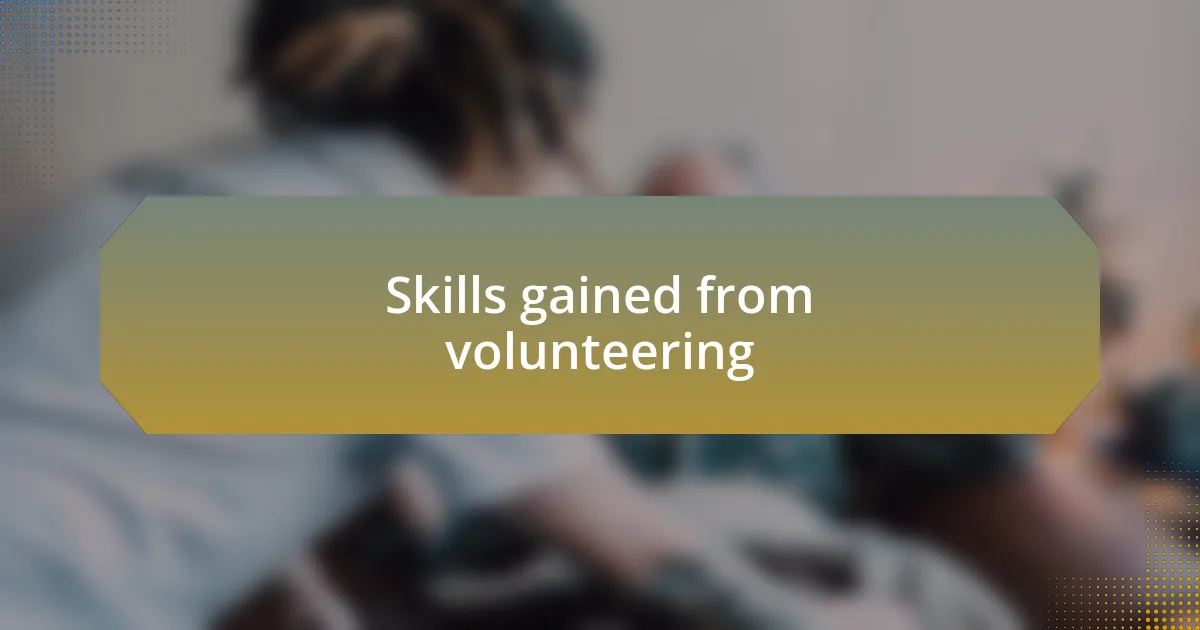
Skills gained from volunteering
Engaging with various roles in volunteering has allowed me to develop a diverse skill set that I never anticipated. For instance, while organizing a community awareness event, I learned how to coordinate logistics, manage time effectively, and communicate with different stakeholders. It was in those challenging moments that I discovered my capacity for leadership, as I guided volunteers and led conversations around complex issues like homelessness.
One memorable experience involved training new volunteers at a local shelter. I never considered myself a teacher, but breaking down the orientation process forced me to improve my public speaking abilities. It was rewarding to see the newcomers grow more confident as we discussed important topics, reinforcing my belief that sharing knowledge is a powerful tool in advocacy. How often do we have the chance to empower others with what we know?
Volunteering has also sharpened my empathy and emotional intelligence. During a food distribution, I encountered individuals whose stories hit me with unexpected intensity. Navigating those interactions taught me how to truly listen and respond with compassion, which I believe is essential in building trust. Isn’t it fascinating how our perceptions can shift when we engage deeply with others? Each of these skills has not only enhanced my personal growth but also my commitment to creating impactful change in the community.
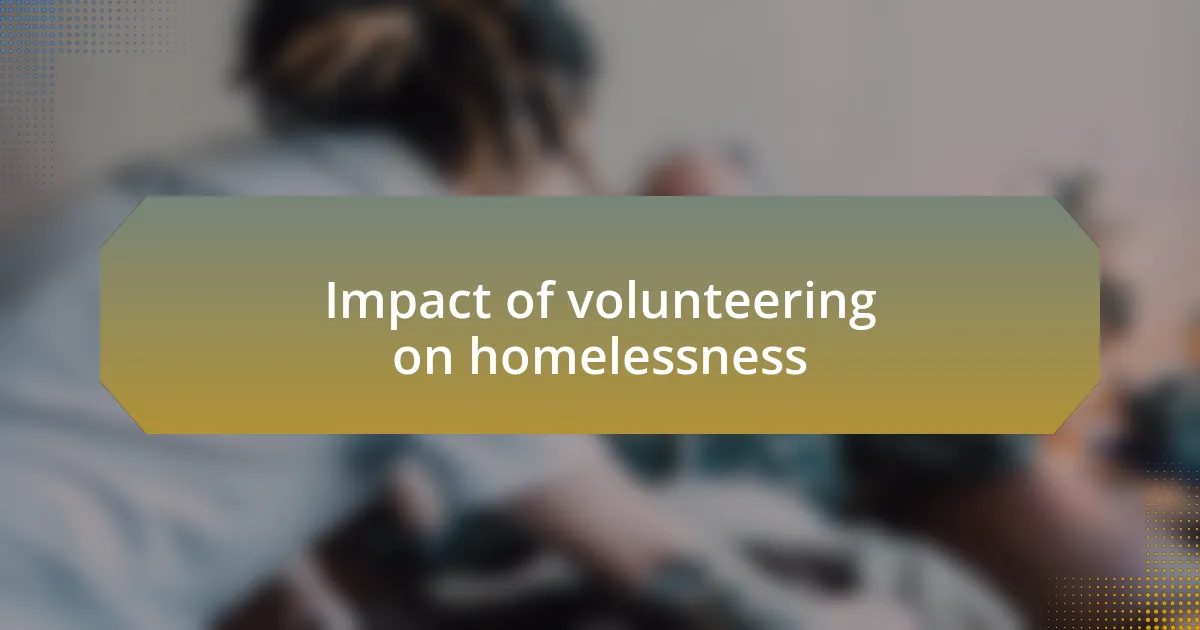
Impact of volunteering on homelessness
Volunteering in homelessness initiatives has a transformative effect, not just on those receiving help but on the volunteers as well. During one of my shifts at a local outreach center, I was confronted with the reality of people’s struggles firsthand. Witnessing an individual shivering in the cold while sharing their story made me realize how crucial compassion is. Have you ever sat down and truly listened to someone’s struggles? It changes everything.
I’ve often felt that volunteering creates a unique bond between those who serve and those who are served. On one occasion, I had a heartfelt conversation with a woman who had just lost her job and her home. Her fear and vulnerability were palpable, but as we talked, I saw a flicker of hope in her eyes. This connection not only motivated me to advocate more fervently for systemic change, but it also underscored how essential human connection is in addressing homelessness. Isn’t it interesting how one conversation can ignite a passion for something more significant?
Additionally, the impact of volunteering extends into community awareness and education. I recall participating in a panel discussion where we shared experiences and insights with a wider audience. The engagement from attendees was inspiring, as many left with a newfound understanding of homelessness and how they could contribute. It left me wondering: how many perspectives can we change if we just share our stories? Each encounter reinforces my belief that our collective efforts can lead to meaningful change.